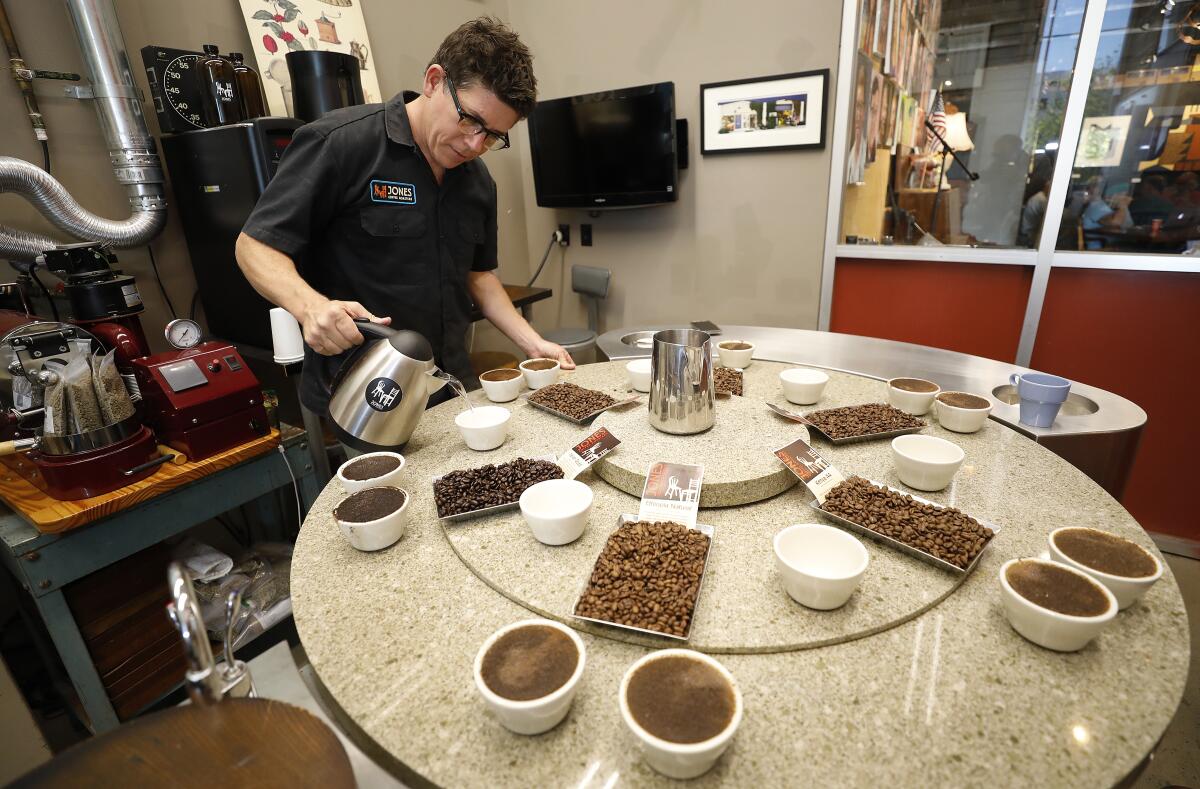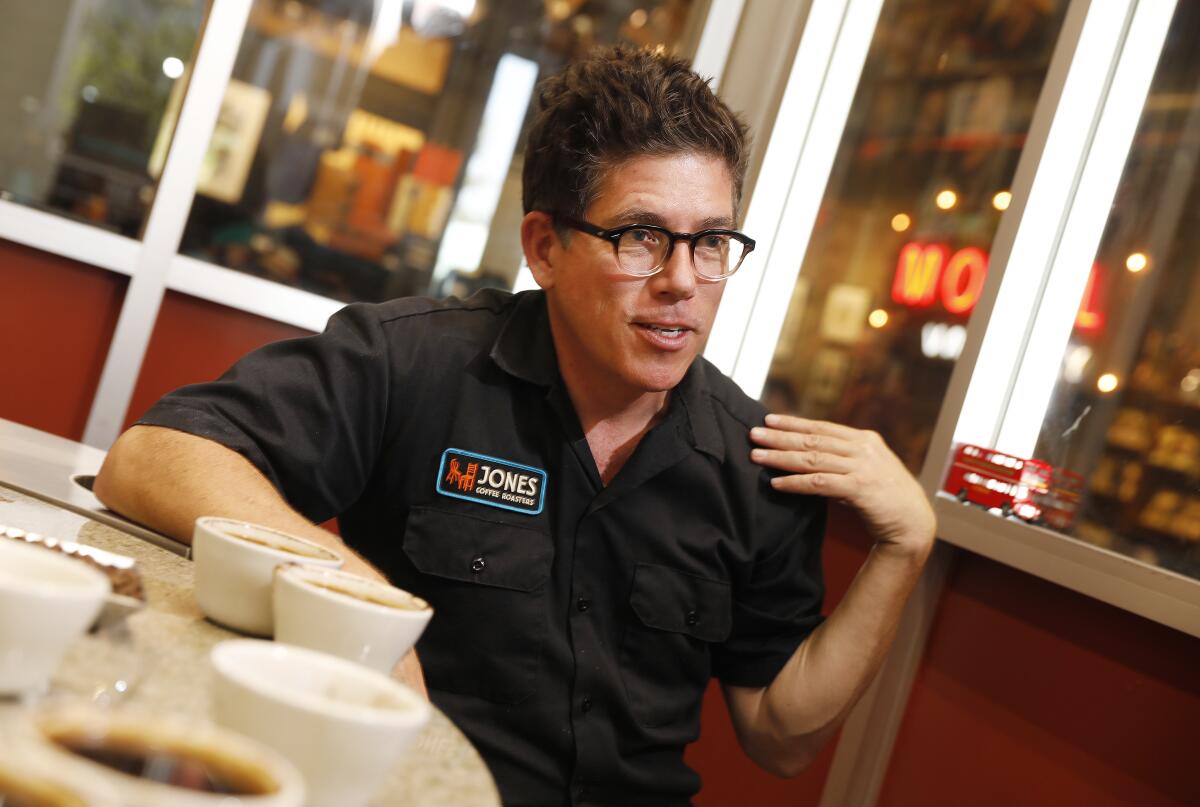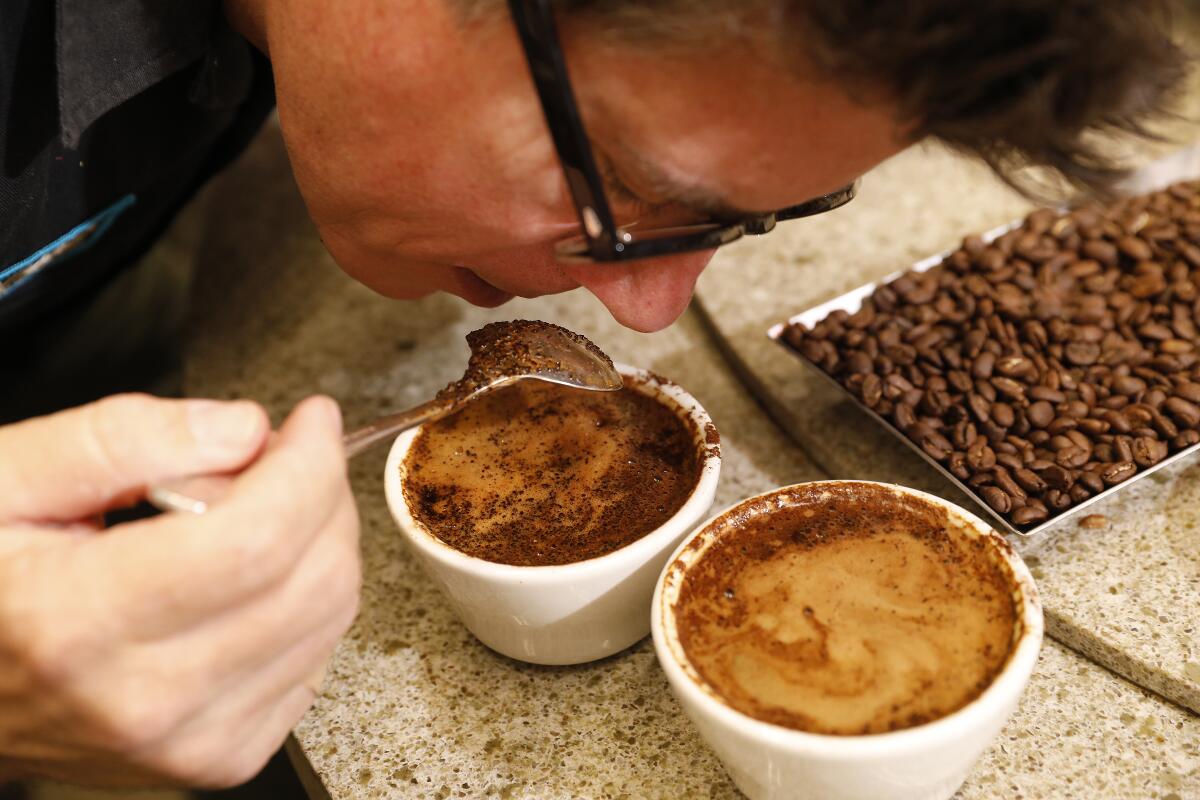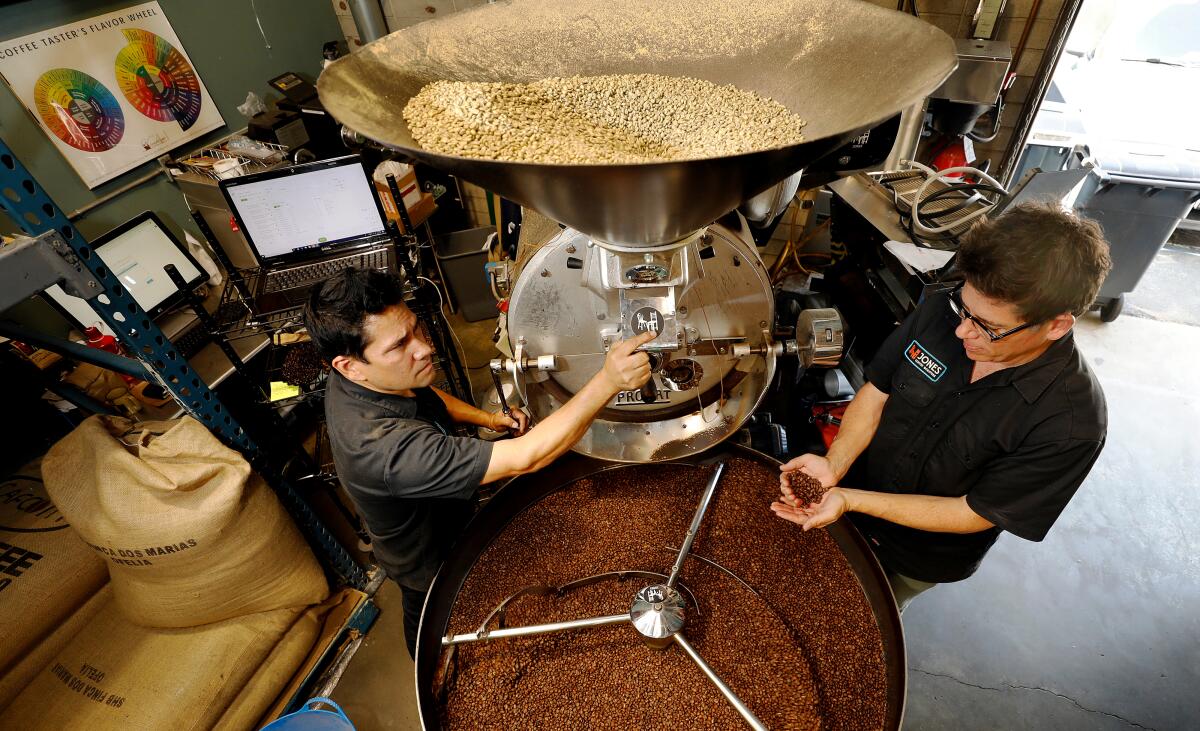This Pasadena roaster sells coffee that lures even Starbucks | How I Made It

Chuck Jones, 49, is a co-founder and co-owner of Jones Coffee Roasters in Pasadena. Jones represents the fifth generation of a family that has earned its money growing, roasting and selling coffee beans, mostly sourced from its own 3,000-acre Guatemalan farm begun in 1870. Jones’ company sells organic coffee beans to select roasters throughout the western U.S., as well as to Starbucks, Whole Foods and restaurants, cafes and hotels. Jones Coffee Roasters has four locations, with a fifth — Hollywood Burbank Airport — coming later this year. The company’s 38 employees sell the rough equivalent of 150,000 cups of coffee a week.
Sustainable
Jones and his family take the sustainability of their coffee operation to a level beyond that of most other businesses. The farm in Guatemala, for example, is “completely off the grid. It runs completely on hydroelectricity,” Jones said. “There are two little hydroelectric plants on the farm. And there are seven natural springs on the farm that are fed from our virgin cloud forest, which is at the farm’s highest elevation.”
Two Marias
Jones was introduced to the family business at age 5, on a 52-hour, 2,700-mile family road trip from the San Marino family home to Guatemala and the sprawling Finca Dos Marias (Farm of the Two Marias), named for his great-great-grandmother Maria Maldonado and great-grandmother Maria Asturias.
“It was like a city,” Jones said. “I just thought, ‘Oh my god, we have a store on the farm.’ We had a medical clinic. We had a wood shop. We had a metal shop. We had a preschool, a middle school, a high school. We had two churches.”

Zealous salesman
Jones, the youngest of five siblings, showed an entrepreneurial spirit that scared off competitors to his lemonade stand. “I’d pull my dad’s fruits and vegetables out of the garden,” Jones said, “and sold them at my stand. I had these extension cords running from our house. I had a toaster oven, selling little frozen pizzas. I had signs up, ‘Pizza. Fruits and Vegetables. And Lemonade.’ I even branded my lemons with a happy face stamp.”
His own boss
By high school, Jones was running his own auto detailing business through his high school’s regional occupational program, using his middle name to give it a little panache — Bosworth’s Private Car Care. “I had a business permit. I had a legitimate business. I was 16 years old. I was my own supervisor for the ROP program. I took a night class on Wednesdays, on business development. I learned about how to write letters. I learned about how to do numbers and cost of goods. Communicate, pitching ideas, presenting things.”
Back to beans
Jones earned a journalism degree from Cal State Long Beach in 1992, but a terrible job market persuaded him to try something else. He and one of his brothers, Larry, were netting $500 to $1,000 a month building personal computers, an amount he considered just “fun money.” Jones said to his brother, “Let’s see if we can make something with this coffee thing.”

No free rides
Grandfather Jose Oswaldo “was really clear, he didn’t want to put anything at the farm at risk because of a little project that we wanted to try out. So he said, ‘You can have pick of the litter. Anything you want on the farm. But, you have to pay just like any of the other customers.’”
Early problems
In 1993, the Jones brothers borrowed $60,000 from their dad, enough to buy a shipping container of coffee, “which is 40,000 pounds of coffee, 250 burlap bags,” Jones said. It was a stunning amount of coffee. Worse, coffee bean prices were surging, and a second cargo container was on the way. “Instead of $60,000, it cost $80,000. The third container was $130,000.”
Breaking the logjam
The plan to sell beans to wholesale customers was moving slowly. By the time the third container was on the way in 1995, the Joneses were still playing catch-up. “We decided to buy a roasting machine and we started roasting the coffee and selling it,” at first, near the front window of a friend’s ice cream parlor in 1998. “No drinks, just selling beans.” They called their venture the Pasadena Roasting Co., then Coffee Roasters of Pasadena. It became Jones Coffee Roasters in 2003.

Brewing success
“Before I did retail, we could hardly give the coffee away,” Jones said. In 2006, Jones opened a coffee shop in Pasadena. “As soon as we started serving coffee, the demand started. I started picking up little restaurants around town. From there it just kept growing. We got Caltech first, and then we picked up JPL as a customer,” he said. A 2006 review in the Los Angeles Times named Jones Coffee Roasters the best French roast coffee among 13 varieties tasted. “All the judges said ours was the best French roast they’ve ever had. That’s really what put us on the map.”
The stumble
In 2011, Jones and his mother, Mireya Asturias Jones, who serves as chief executive, figured it was time to expand with a new coffee shop in West Hollywood. “I thought it was going to be an easy thing,” Jones said. “It failed miserably.” The West Hollywood store was bringing in $10,000 a month, but Jones was spending $13,000 a month on it. That was when he remembered something he heard from one of his mentors, CasaBlanca Fan Co. founder Burton A. Burton, who made a fortune selling ceiling fans. “Your second store will be the hardest store,” Jones recalled Burton saying.
Hard lessons
The second coffee shop closed after just three years. “You can always do whatever it takes to run your first store,” Jones said, “But as soon as you go to your second store, then you actually have to have standards, procedures. ‘This is how we onboard an employee. This is how we manage advancement. This is how we order our product supply chains.’ Then you’re really honing the cost of goods, your transactions, your average prices and everything. All that stuff really comes together in your second store.”
Second try
Jones didn’t try to open another store again until 2016, but this one made sense, located at the independent bookstore Vroman’s in Pasadena. This time, Jones was ready. “I adjusted the expenses, honed down our costs, honed our training,” Jones said. “We had more clarity. We had a template. We had a new slate to work from.” Jones then used what was learned with the Vroman’s operation to improve his first store.
Holding pattern
Jones said the expanding is done, until he can gauge the new business he expects from Burbank airport. “Our board is telling me, ‘Let’s sit on these eggs for a little bit.’ When we open Burbank there’s going to be a lot of wholesale business coming in and I want to be able to handle that. There will be a lot of people who aren’t familiar with our brand coming through the airport and they are going to think, ‘This is good coffee.’” Jones’ brother Larry, who is a shareholder and board member, will be account manager for Burbank airport sales.
Future growth
Jones dreams of a move north to Paso Robles and a crop change. “My sister has an olive farm up there, so she makes olive oil. She also grows grapes, and my nephew makes wine. We go up there and do the harvest,” Jones said. “There’s a sense of accomplishment when you have the olive oil in the bottle and you’re like, ‘Yeah, we picked these olives. We crushed them. We put them into a bottle.’ In another 10 to 15 years, I’ll be moving up there.”
More to Read
Inside the business of entertainment
The Wide Shot brings you news, analysis and insights on everything from streaming wars to production — and what it all means for the future.
You may occasionally receive promotional content from the Los Angeles Times.











